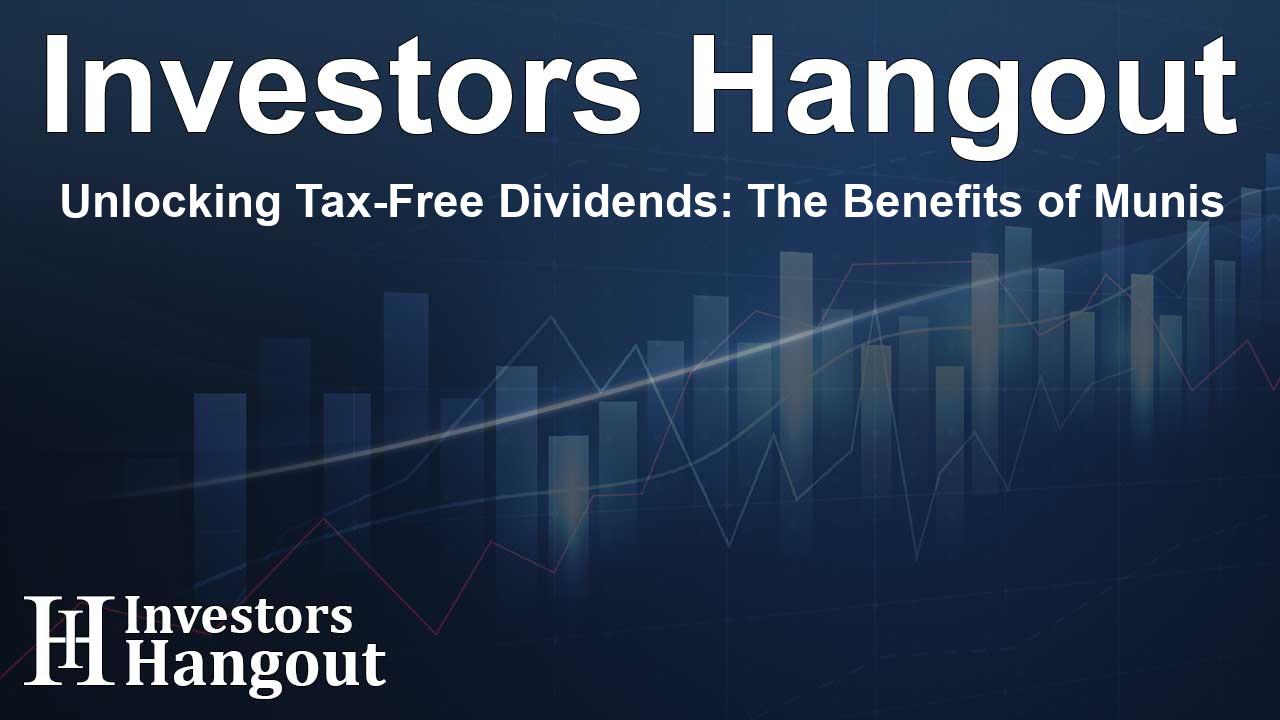Unlocking Tax-Free Dividends: The Benefits of Munis

Exploring Tax-Free Investment Opportunities
Imagine having access to two affordable funds that offer impressive dividends, exceeding 7.5%, and the bonus of being tax-free. These investments might just be the last golden chances available in a stock market that's been considered overheated. The stock market's steady climb since recent tariffs were halted has diminished the income-generating potential from S&P 500 stocks, leading investors to seek alternative income sources.
This shift in focus brings us back to the benefits of tax-free dividends, particularly those associated with municipal bonds. Municipal bonds, often recognized as ‘munis’, are debt securities issued by state or local governments to finance public infrastructure projects. What makes these munis attractive is that they typically offer yields higher than the 10-year Treasury note by around 200 basis points.
Current Landscape of Municipal Bond Performance
As it stands, the S&P 500 has achieved approximately a 10% return this year. However, when we look towards municipal bond investments such as the iShares National Muni Bond ETF (NYSE:MUB), the returns tell a different story, remaining relatively flat. This indicates a golden opportunity for savvy investors willing to delve deeper into the world of municipal bonds.
The global economic conditions are sparking a resurgence in municipal bonds, even after they experienced a downturn earlier this year due to tariff uncertainties. While the initial buying window might have seemed optimal during that volatility, significant gaps persist, indicating there’s still time to capitalize on this underappreciated asset class.
Understanding the Appeal of Closed-End Funds
While many individual munis may be challenging for casual investors to access, utilizing Closed-End Funds (CEFs) allows for a more accessible route. For instance, while MUB is providing a modest yield of around 3%, by investing in CEFs focused on munis, investors can aim for much more significant payouts. This structure is appealing notably because it garners contributions from experienced human managers who are often ahead of the curve in identifying new bond issues.
Investing through CEFs not only provides enhanced access to muni bonds but allows investors to enjoy the substantial tax benefits associated with these instruments. For instance, in terms of value, a 5% yielding muni bond for someone in the highest tax bracket could equate to an equivalent yield of 8.2% on U.S. Treasuries or even 10% on other debt products, like corporate bonds.
Identifying Opportunities: Invesco California Value Municipal Income Trust
One specific CEF worth mentioning is the Invesco California Value Municipal Income Trust (NYSE:VCV). This fund stands out in terms of yield, posting an impressive 7.5% return with additional tax advantages. Not only does VCV outperform MUB in yield terms, but it has consistently outshone its competitors since its inception.
Exploring Broader Options: RiverNorth Managed Duration Municipal Income Fund II
In addition to VCV, a national-focused option such as the RiverNorth Managed Duration Municipal Income Fund II (NYSE:RMMZ) should be on investors' radar, given its attractive 8% yield. This fund is currently trading at a discount, which provides a unique entry point for those looking to invest in tax-free munis.
Currently, RMMZ is trading with a 7.9% discount, and with interest rates expected to trend lower, this fund's value is projected to appreciate. As more investors recognize the advantages of tax-free CEFs, demand for RMMZ is likely to increase, further narrowing the discount and enhancing its value proposition.
Why Choose Municipal Bonds?
The safety of a well-managed fund like RMMZ, which primarily invests in high-grade municipal bonds rather than speculative high-yield options, provides peace of mind to investors. This attribute is crucial in a market where economic factors can influence investment performance significantly.
As you explore the potential of tax-exempt municipal bonds, consider how these investment strategies can bolster your portfolio. The combination of attractive yields, minimal tax liabilities, and relative security makes municipal bonds, especially through CEFs, a compelling choice.
Frequently Asked Questions
What are municipal bonds?
Municipal bonds, or 'munis', are debt securities issued by local or state governments to fund public projects, offering tax exemptions to investors.
How do closed-end funds (CEFs) work?
CEFs are investment funds that raise money through an initial public offering and then trade on stock exchanges, often providing higher yields than ETFs.
What are the advantages of tax-free dividends?
Tax-free dividends enable investors to retain more earnings, providing competitive yields while minimizing tax liabilities, making them attractive for income-focused investors.
What is the yield difference between MUB and VCV?
MUB currently yields around 3%, while VCV boasts a much higher yield of 7.5%, plus additional tax benefits, enhancing its attractiveness.
Why is RMMZ considered a good investment?
RMMZ offers a higher yield of approximately 8%, trades at a discount, and invests largely in investment-grade bonds, which can provide capital appreciation as interest rates fall.
About The Author
Contact Riley Hayes privately here. Or send an email with ATTN: Riley Hayes as the subject to contact@investorshangout.com.
About Investors Hangout
Investors Hangout is a leading online stock forum for financial discussion and learning, offering a wide range of free tools and resources. It draws in traders of all levels, who exchange market knowledge, investigate trading tactics, and keep an eye on industry developments in real time. Featuring financial articles, stock message boards, quotes, charts, company profiles, and live news updates. Through cooperative learning and a wealth of informational resources, it helps users from novices creating their first portfolios to experts honing their techniques. Join Investors Hangout today: https://investorshangout.com/
The content of this article is based on factual, publicly available information and does not represent legal, financial, or investment advice. Investors Hangout does not offer financial advice, and the author is not a licensed financial advisor. Consult a qualified advisor before making any financial or investment decisions based on this article. This article should not be considered advice to purchase, sell, or hold any securities or other investments. If any of the material provided here is inaccurate, please contact us for corrections.
